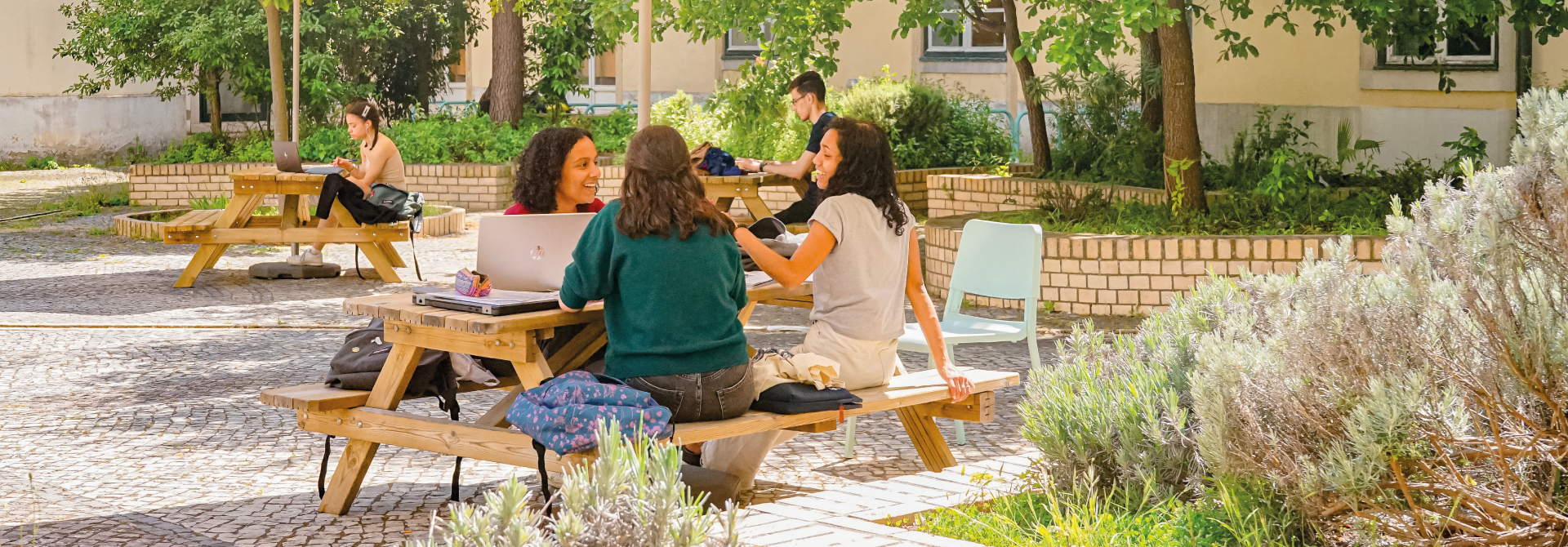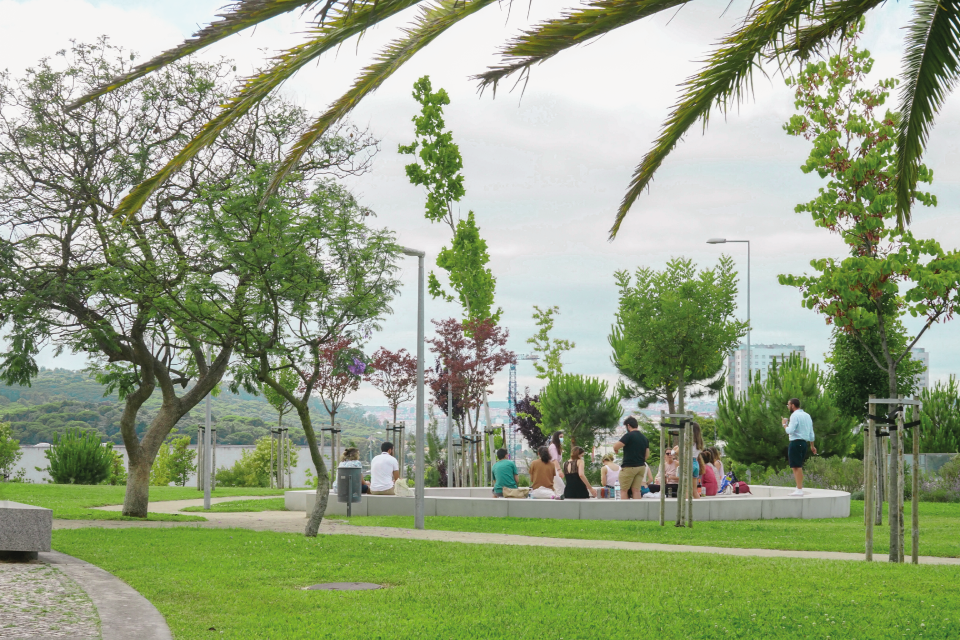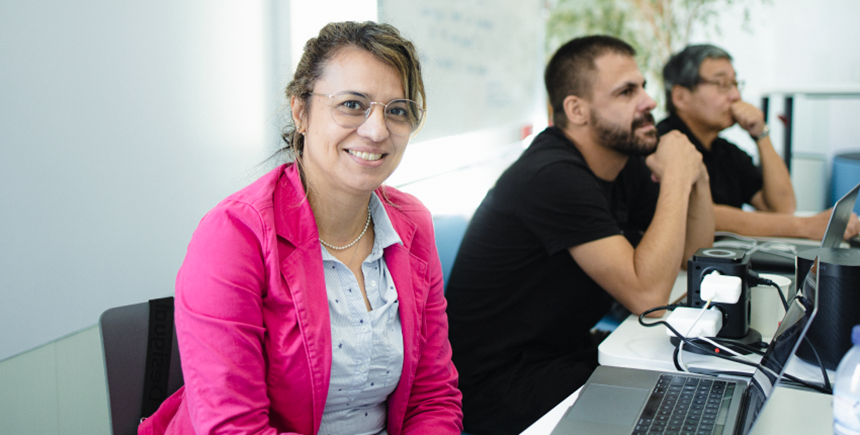International Student

International Students
Useful Information
NOVA IMS is located in Campus de Campolide, a Campus that provides some facilities such as school residence, food services, bank machine, health services and spaces for leisure and physical activities, besides all the services that you can find at NOVA IMS, as Academic Services, IT services and Library and Documentation Services.
At Academic Services you can find all the support and information you need regarding for instance: enrollment, timetables and calendars (Exams Schedule, Academic Calendar).
Helpdesk support is provided by IT Department to every NOVA IMS enrolled student, IT Department also offer a software set from ESRI, Clarck Labs, Microsoft, MicroStrategy, OutSystems, QlikView, SAP, SAS and SYBASE for teaching and research purposes.
Specialized in the areas of Statistics and Information Management, NOVA IMS Library aims to provide students, teachers and researchers access to documentation and information necessary for the development of their scientific and academic activities.
Here you can access about 5,000 books, theses and dissertations in paper and electronic version from the UNL Repository, and full-text electronic journals from JSTOR, Emerald, Wiley Blackwell and B-On Online Knowledge Library (over 22.000 scientific international publications from 19 publishers).
Click here for more Useful Information.
Visa / Entry in Portugal
It’s student's responsibility to guarantee they fulfil the necessary requirements to be eligible for a student visa.
Applicants, nationals from EU/EFTA nations, do not need a visa to study in Portugal.
Starting in 2026, ETIAS travel authorisation is an entry requirement for non-EU visa-free nationals.
EU/EFTA nations students who remain in Portugal for longer than 3 months must apply for the Certificado do Registo de Cidadão da União Europeia (CRUE Certificate of Residency).
This certificate must be applied for at their local Council within the 30 days following their first three months in national territory.
Please see: https://europa.eu/youreurope/citizens/residence/documents-formalities/registering-residence/index_en.htm
Please see: https://www.acm.gov.pt/-/sou-cidadao-europeu-e-necessario-registar-me-para-residir-em-portugal-
Please see: https://informacoeseservicos.lisboa.pt/en/services/detail/european-union-citizen-registration-certificate (for Lisbon Council).
Students holding a residence permit issued by a Member State of the European Union are authorised to entry and stay into national territory for a maximum of 90 days within any 180-day period. In order to extend their stay, they need to apply for a residence permit for higher education students with visa exemption under no. 4 of article 91 of REPSAE.
Please see: https://aima.gov.pt/pt/estudar/autorizacao-de-residencia-emitida-a-estudantes-do-ensino-superior-art-o-91
Students from non-EU nations normally need a visa to study in Portugal. In order to find out if they need a visa and how to apply, they must contact the embassy or consulate of Portugal in their home country.
Visa application processing times can vary greatly depending on volume of applications and the applicant’s home country. It is recommended to submit the complete application at least two months prior to the student’s departure.
As a general rule, the necessary documents for student visa applications for entry in Portugal are:
- National Visa application filled and duly signed by applicant;
- 2 Photos, even, passport type, recent and in good condition to identify the applicant;
- Passport or other travel document, valid for 3 months after the estimated date of return. Photocopy of passport (biographical data);
- Proof of regular status, if you are of a nationality other than that of the country where you are applying for a visa, valid for more than the date of expiry of the visa you are applying for;
- Valid travel insurance, covering necessary medical expenses, including urgent medical assistance and possible repatriation;
- Criminal record certificate, issued by the competent authority of the country of the applicant’s nationality or of the country where the applicant has resided for over a year (except for applicants under sixteen), with the Hague Apostille (If applicable) or legalised;
- Proof of financial resources/means of subsistence, as defined by decree of the competent government members;
- Document issued by the higher education institution certifying enrollment or that the applicant fulfils admission criteria or has been accepted to university for a study program and has enough financial resources to attend such program;
- Proof of housing.
The referred documents are the mandatory initial documents to be submitted. The consular post may request additional documents at their discretion, namely authenticated and legalized academic documentation (diploma certificate and transcripts), so this information should be confirmed when requesting a Visa.
Portuguese visa processing time varies depending on the purpose of your visit. It can take anywhere from two weeks up to two months, so it is advisable to start the Portuguese visa application process as soon as you receive your Admission Letter.
It is not recommended to entry in Portugal with a Tourist Visa (Schengen Visa) if you are planning to stay for periods of over 3 months.
Although it’s also possible to entry in Portugal with a Schengen visa and then try to apply for a Residence Permit for Higher Education Students, it’s known that the Portuguese Agency for Integration, Migration, and Asylum (AIMA) has a huge backlog and delay time for scheduling appointments, which can be a problem since a Schengen visa is only valid for 90 days.
In accordance with Ordinance no. 111/2019, of 12 April, which reinforces the simplification of the process of access and residence in Portugal by higher education students who are nationals of countries outside the European Union (EU), following student's admission, NOVA IMS’ Admissions Office shares with the Directorate General for Higher Education (DGES), responsible for transmitting it to the Directorate General of Consular Affairs and Portuguese Communities (DGACCP), the lists of admitted students.
The International Student Support Office provides visa information, offering further assistance on applying for a student visa as well as information on related areas of immigration.
Please assure you have all the required documents/conditions before requesting our help.
Please be aware that NOVA IMS cannot interfere in Embassy’s decision.
The Visa process is managed by the Ministry of Foreign Affairs and NOVA IMS is not part of the process.
Tips
- Apply for Visa as soon as possible! Visa issues demand much time and attention;
- Check with the relevant Embassies / Consulates on which documents you need to obtain a visa;
- Double check all forms and the data you fill in. Sometimes small mistakes result in the refusal of the visa request;
- Always keep copies of the originals you submit! You may need them.
You can find information regarding visas and entry in Portugal at:
Housing / Accommodation
The admission at NOVA Information Management School does not include an offer for a room in a dormitory.
NOVA University of Lisbon has 3 Residence Halls to accommodate students from the 9 existing Faculties: https://sas.unl.pt/en/accommodation/
These spaces are aimed at students, teachers and researchers at the university, with priority given to Portuguese scholarship holders students and foreign students on mobility programmes. Since there’s a limitation of places available for each Faculty, most students have to find a room themselves on the private market.
Please visit: https://www.novaims.unl.pt/pt/ensino/alunos/programas-de-mobilidade/erasmus/useful-information/.
Please notice that the information contained on the websites mentioned are the responsibility of the respective organizations.
NOVA University of Lisbon created Rede ¼ (¼ Network), an innovative solution to bring together those who have available rooms with those who need them to live and study in greater Lisbon. With a wide network of partners and a dedicated and multidisciplinary team, REDE 1/4 is now available.
Please visit: https://www.novaims.unl.pt/en/education/students/rede/.
After Arrival
- EU/EFTA nations students who remain in Portugal for longer than 3 months must apply for the Certificado do Registo de Cidadão da União Europeia (CRUE Certificate of Residency).
This certificate must be applied for at their local Council within the 30 days following their first three months in national territory.
Please see: https://europa.eu/youreurope/citizens/residence/documents-formalities/registering-residence/index_en.htm
Please see: https://www.acm.gov.pt/-/sou-cidadao-europeu-e-necessario-registar-me-para-residir-em-portugal-
Please see: https://informacoeseservicos.lisboa.pt/en/services/detail/european-union-citizen-registration-certificate (for Lisbon Council).
- Third Country nationals holding a Temporary Stay Visa for Study planning to stay in Portugal for longer than 365 days (typically the duration of the enrolled study program) may request an extension of stay from AIMA for up to 1 year within 30 days before the expiration date.
- In the absence of a long term visa for Portugal, students holding a residence permit issued by a Member State of the European Union planning to stay in Portugal for longer than 90 days must apply for a Autorização de Residência/Residence Permit for higher education students with visa exemption under no. 4 of article 91 of REPSAE, upon arrival in Portugal.
- Third Country nationals holding a Residence Visa for Higher Education Students and planning to stay in Portugal for longer than 90 days must apply for a Autorização de Residência/Residence Permit for higher education students.
Please check your Residence visa stamp, usually for student residence visas there’s already a pre-scheduled appointment. If so, you should have a link on your visa stamp. If not, you’ll need to schedule and follow the procedure (You can also check if there’s a pre-scheduled appointment by registering with your data in the SEF/AIMA Portal).
The application for granting a residence permit is made by appointment, and is delivered in person with a specific form signed by the applicant or their legal representative. It can be presented at any AIMA Store, which can send it, after instruction and decision, to the services in the applicant's area of residence.
Please see: https://aima.gov.pt/pt/estudar/autorizacao-de-residencia-emitida-a-estudantes-do-ensino-superior-art-o-91
For third-country nationals, the required documents are similar to the ones required for visa applications:
- Two identical photographs, passport size, in color and with a plain background, updated and with good identification conditions (if the appointment is made at the AIMA Stores in Odivelas or Aveiro);
- Valid passport;
- Residence visa, except for the application for granting a residence permit without a visa;
- Declaration, under oath, of your residence address, stating under what terms you are residing in the indicated dwelling (e.g. owner, tenant, sublessee, usufructuary, borrower, among others); and
- In situations where you live in the place because you are the owner or usufructuary, you must present a land registration certificate or provide the respective access code to prove the right of ownership or the right of usufruct, or
- In situations where you live in the location as a tenant or lessee, among others, a declaration from the landlord of the property or the hosting entity, mentioning the legal situation underlying the right to use the property;
- Proof of means of subsistence;
- Criminal record of the country of nationality of the person applying or criminal record of the country where the citizen lived for more than a year, before residing in Portugal, duly authenticated;
- Declaration from the educational establishment stating that you are attending the course and have paid your tuition fees up to date;
- Health insurance or proof that you are covered by the National Health Service.
WHAT TO DO IF YOUR VISA EXPIRES BEFORE YOU LEAVE THE COUNTRY…
- Call Agency for Integration, Migration, and Asylum (AIMA) (+351 217 115 000) and schedule an appointment to request an extension of stay. Due to the high number of queries, your call is more likely to be taken early in the morning (8am) or late in the evening (7pm).
- Holders of short stay visa or temporary stay visa can also request on-line an appointment next to the Agency for Integration, Migration, and Asylum (AIMA) to request an extension of stay.
- After you schedule your appointment (probably in a two/three month’s time) you will need to gather the necessary documents.
- After you gather all these documents you go to Agency for Integration, Migration, and Asylum (AIMA), wait patiently, and pay. Then you receive a receipt that you MUST keep, for this will be the only proof that you have requested an extension of stay. Give one to two months for your visa card to be finally ready.
WHAT TO DO IF YOUR RESIDENCE CARD/TITLE EXPIRES BEFORE YOU LEAVE THE COUNTRY…
- To apply for renewal you must possess a valid residence permit or one that has been expired less than 6 months ago;
- You can renew automatically through AIMA's online services.
Alternatively, you can renew in person at a Registo office, by previous appointment. - After gathering all the necessary documents, go to a Registo office, wait patiently and pay. You will then receive a receipt that you MUST keep, as it will be the only proof that you have renewed your authorization. Wait one to two months until your residence/title card is finally ready.
Please see: https://justica.gov.pt/en-gb/Servicos/Renewal-of-Residence-Permit
HOW TO OBTAIN A CERTIFICATE OF RESIDENCE:
- If you live at a Students’ Residence: this will be included in the letter from the institution/residence.
- If you don’t live at a Students’ Residence and don't have a rental contract you may, alternatively, go to the corresponding Junta de Freguesia (which is a kind of city hall of each neighbourhood) and ask for a Atestado de Residência. In general, it is common to be asked to fill out a residence declaration/housing declaration form, present an identification document and an address confirmation document. In many, for example, it is necessary to present proof of address, certified by a certified Public Entity (sometimes a Multipurpose Certificate stating your address in Portugal and issued by the school is enough), or recent utility bill (water, electricity, gas, audiovisual and internet services). Alternatively, you can present yourself with 2 (two) witnesses, registered in the parish and resident for more than 180 consecutive days (ID copies of both).
HOW TO OBTAIN A CRIMINAL RECORD
Foreign citizens wishing to apply for or renew a residence permit in Portugal do not need a certificate of criminal and contumacy record. They can authorize the Agency for Integration, Migration, and Asylum (AIMA) to access their record, without having to go to the criminal record service points. For applications for Granting a Residence Permit with Exemption from a Residence Visa, the presentation of a criminal record from the country of origin or the country where you have resided for more than one year (before entering Portugal) is mandatory, including for citizens who have been in Portugal for more than one year.
Online
If you request the certificate of criminal record online, you must access the website Registo Criminal Online.
In person
You can apply for a criminal record certificate in person:
- at one of the branches of the Criminal Identification Services, which can be scheduled through the contacts at each branch;
- in the Courts, being able to make an appointment using the court appointment scheduling form;
- in Citizen Spaces, where this service exists. You can request information and make an appointment by calling 300 003 990 or using the contact form on the ePortugal portal.
Health
The National Health Service (SNS) in Portugal has a network of bodies and services which provide complete healthcare to the whole population, through which the State guarantees peoples' right to health.
The SNS is made up of all the public entities that provide healthcare - hospitals, local health units, health centres and family health units, or groups of health centres.
Under EU legislation on Social Security, nationals from the EU member states, Iceland, Liechtenstein, Norway and Switzerland enjoy the same benefits as Portuguese citizens in terms of access to free or reduced-cost healthcare.
In order to benefit from these services, the citizens falling in the category mentioned above need to show the EHIC (European Health Insurance Card).
Third Country nationals must hold medical insurance or benefit from other special medical coverage/arrangements for the entire stay in Portugal.
Third Country nationals, who have been residing in Portugal for more than 3 months (90 days), may wish to apply for the National Health Service Card (Cartão do Utente do SNS). The card is free of charge and gives you access to Portuguese Public Health Service. To obtain the NHS card foreigners must show in the health services in their area of residence, documentation proving their residence authorisation in national territory, according to the situations.
NIF Number / Bank Account
Opening a bank account in Portugal is recommendable to third country nationals as withdrawal from foreign banks can be rather expensive and foreign credit cards may not always be accepted.
The procedure to open a bank account is quite simple. You will need: your passport or international ID card, an address in Portugal and a Portuguese fiscal number.
Please check the documentation provided by the Embassy/Consular Services, usually for student visas, there’s already the provision of a temporary NIF number. If not, you’ll need to schedule and follow the procedure.
Following the legislative amendment to article 19 of the General Tax Law (LGT), operated by the Decree-Law No. 44/2022, of July 8, and consequent Circular Letter No: 90057, of July 20, 2022, upon registration and attribution of a Tax Identification Number (NIF) to a national or foreign citizen, as a non-resident, with address in a third country, i.e. in a country not belonging to the European Union (EU) or the European Economic Area (EEA), the appointment of a tax representative is not mandatory.
The request for the attribution of NIF to foreign citizens from third countries can be made electronically, on the Tax Office portal (via e-balcão), presented by the representative (resident in Portugal), or in person at the citizen's shop, and in the Tax Office services by prior appointment.
Scheduling must be requested through Tax Office Portal by registering at the Face-to-Face Service by Appointment accessible through the Portal's home page in the lower right corner under "Contact us" or, by calling 217 206 707 from the Telephone Assistance Centre, at working days, from 09:00 to 19:00 (Portuguese language).
Alternatively, you can also schedule an appointment for the Tax Office service at the National Immigrant Support Centre (CNAI) Lisbon by calling 808 257 257 / 218 106 191, at working days, from 09:00 to 19:00 (English language), or by emailing cnaim.lisboa@acm.gov.pt
National Immigrant Support Centre (CNAI) Lisbon
Rua Álvaro Coutinho, 14
1150-025 LISBOA
cnaim.lisboa@acm.gov.pt
9h-19h00m
You can also request to book an appointment using the Tax Office Services emails of the tax office of the area where you intend to live.
Before going to a service desk in person, we recommend booking in advance. If you choose to go to a service desk without booking, it is recommended that you do so early in the morning, to guarantee a service ticket.
You must be in the Tax Office service before 9 a.m., after which you can take the D ticket, which has a maximum limit of 50 per day.
You should bring with you a copy and the original of the following documents: Passport and proof of address in the country of origin.
Working in Portugal as student
Holders of a residence permit for higher education students issued/applied for in Portugal, or students in higher education holding a residence permit granted by the Member State of the European Union covered by a European Union or multilateral program with mobility measures or by an agreement between two or more higher education institutions (see procedure for communication of mobility), may carry out a professional activity, as worker or self employed, in addition to the activity that gave rise to the visa (whenever their entry and stay has been authorised), and may register with the Public Employment Service for this purpose. EU/EEA/Switzerland nations students do not need a work permit or visa.
There’s no reference in the Portuguese law to the limit of hours you’re allowed to work. Nonetheless, since your primary activity, the activity which entitled you the Visa and Residence Permit, is study, it’s expected that the workload doesn’t compromise your studies.
Holders of a temporary stay visa for study are not legally authorized to carry out a professional activity, as worker or self employed.
HOW TO APPLY FOR A SOCIAL SECURITY IDENTIFICATION NUMBER (NISS)
The Social Security Identification Number (NISS) allows access to rights and obligations in Social Security.
The NISS request is made by filling out the form available on the Social Security portal, to which the necessary documents must be attached in each case.
Foreign people
- from the European Union, European Economic Area or Switzerland
- civil ID document from the country of origin and its copy.
- from third country
- Passport, Residence Permit, Residence Authorization (temporary or permanent) or other civilian identification document from the country of origin and its copy.
Please see: https://en.seg-social.pt/registration
Portuguese Language Courses
NOVA University of Lisbon’ School of Social Sciences and Humanities (NOVA FCSH) provides several language courses, as well as courses of Portuguese as a foreign language targeted to foreign and international mobility students. Classes are held in its facilities located at Av. de Berna, n. 26–C, P–1050 LISBOA. These classes will not be offered at NOVA IMS' Campus.
You can find out more information about these courses at FCSH is this website: http://ple.fcsh.unl.pt/en/start/
Alternatively, and part of the national immigration policies, Portuguese government created the “Português Lingua de Acolhimento” (PLA - Portuguese Host Language) programme, that seeks to provide foreign citizens with access to learning the Portuguese language, which is essential for their social, professional, and civic inclusion.
The programme was developed to address migrants' needs, promoting social cohesion and preventing discrimination.
The programme is available through public education institutions, Qualifica Centres [search for “Acolhimento”] and centres of the Institute of Employment and Vocational Training (IEFP)
[search for “Português Acolhimento”].
Scholarships
NOVA IMS Social Mobility Scholarship
NOVA IMS offers a social mobility scholarship for students with a proven need for financial aid. This mission is associated with the development of the fundamental pillars of the Inclusion Policy of Universidade NOVA de Lisboa, universality, social mobility and talent.
NOVA University Lisbon provides its students with access to various financial supports in collaboration with the General Directorate of Higher Education (DGES), companies, institutions and individuals, promoting the participation of society for a good common – higher education.
Please see: https://sas.unl.pt/en/scholarships-2/scholarships_/
«Navegante» Travel card
Lisbon’s transport system consists of metro, trams, funiculars, buses, commuter trains and ferries. Public transport in Lisbon is fairly simple to use and generally safe.
Navegante is the ideal card for frequent users of public transport. It can be topped up with money (‘zapping’) and passes.
Youngsters up to the age of 23 benefit from a 100% discount on the cost of the Navegante pass. Although free, monthly top-up of the pass for young students is mandatory.
For new memberships, you must request the issuance of the card Online at Metro or Loja Navegante;
Customer Navegante Spaces and Points of a Transport Operator by presenting the following documents:
- Application form duly filled;
- Identification document;
- Tax identification number (confirmed by presenting the identification document or another document proving the Portuguese NIF);
- Contact details (address, email and mobile phone number);
- Passport size photograph of the card holder's face.
Contacts
If you want more information about NOVA IMS degrees, contact any members of the team:
-
 Ana SousaSupport Office for International Students, Insertion in Professional Career, Alumni and External Relationsadnovaims@novaims.unl.pt
Ana SousaSupport Office for International Students, Insertion in Professional Career, Alumni and External Relationsadnovaims@novaims.unl.pt -

-
 Hugo CaldeiraSupport Office for International Students, Insertion in Professional Career, Alumni and External Relationsadnovaims@novaims.unl.pt
Hugo CaldeiraSupport Office for International Students, Insertion in Professional Career, Alumni and External Relationsadnovaims@novaims.unl.pt -


Facts of NOVA IMS
NOVA Information Management School (NOVA IMS) is the Statistic and Information Management School of Universidade NOVA de Lisboa. This Institute was established in 1989 in response to the shortage of experts in information management, and also to fulfill the growing need of graduate and undergraduate degrees regarding new information technologies.

Accreditations and Certifications
NOVA IMS has numerous Accreditations and Certifications related to its study cycles. Find out here what they are.



